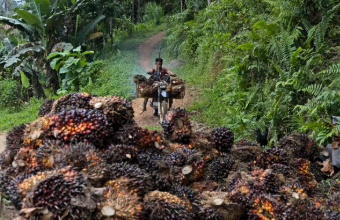
Wai-Chan Chan on why supply chains have to be made more sustainable, ethical and reliable
NORTHAMPTON, MA / ACCESSWIRE / May 21, 2024 / The Consumer Goods Forum

Oil palm harvesting in South Sulawesi, Indonesia in April: Smallholders can be brought into sustainable supply chains. © AP
Wai-Chan Chan is managing director of The Consumer Goods Forum, a global network of retailers and manufacturers focused on industry standards and driving positive change.
Southeast Asia is home to nearly 15% of the world's tropical forests, but at least 1.2% of these woodlands are destroyed each year.
The rapid clearance of trees has resulted in an unprecedented increase in dangerous greenhouse gas emissions, with more than 400 million metric tons of carbon being released into the atmosphere every year from Southeast Asia.
These statistics are a stark reminder that there is much work to be done in this region to create a forest-positive future.
Sustainable economic development in and around forests can enhance the longevity of local companies and multinational brands that rely on supply chains in Southeast Asia.
For business, the way forward is to change the way key commodities like palm oil, soybeans and beef, as well as paper, pulp and fiber-based packaging, are sourced.
While this is a complex global challenge and the responsibility of a multitude of actors, every business that touches upon forests has a crucial role to play.
Through collaborating with consumer products companies, The Consumer Goods Forum's Forest Positive Coalition has been developing evidence-based approaches to create supply chain strategies that avoid deforestation and the conversion of woodlands.
The first step that companies doing business in Southeast Asia can take is to implement a policy against commodity-driven deforestation and land conversion.
To make this possible, all businesses should increase the traceability of their supply chains to understand where deforestation, land conversion and human rights risks may occur. It is also crucial that businesses synchronize their policies with a timebound action plan aligning production with sustainable economic development, the improvement of local livelihoods and the mitigation of the climate crisis to achieve "forest-positive" commodity production.
In the Indonesian provinces of Aceh and North Sumatra, key areas for palm oil production and sourcing, an abundance of stakeholders and initiatives has risked fragmenting the push for sustainable production, livelihoods and conservation.
In these areas, Consumer Goods Forum members including Danone, Mondelez International, PepsiCo and Unilever are working with the Coalition for Sustainable Livelihoods, a localized platform that brings together district and provincial officials, industry players, farmers, communities, civil society groups and strategic partners, to facilitate peer-to-peer learning, knowledge of product development and alignment of sustainable development priorities for palm oil landscapes.
On a supply-chain level, companies often require suppliers to tackle deforestation, but then fail to support them with guidelines, training and measurement tools to achieve this goal. Deforestation can be eradicated from the entire length of value chains only with help from such suppliers, however.
The Smallholder Hub program in Aceh Singkil regency, Indonesia, illustrates how companies can support farmers in their supply chains. The program has brought small farmers in the Leuser ecosystem -- a critical area of 2.6 million hectares of tropical Sumatran rainforest -- into the sustainable palm oil supply chain.
Members, including General Mills, have been investing in this program since 2022. To date, it has provided smallholders with training on sustainable farming practices, financial literacy and deforestation issues.
This training has helped independent smallholders turn knowledge of the U.N. Food and Agricultural Organization's Good Agricultural Practices into action and diversify their income sources, helping improve their livelihoods and increase crop yields using existing land, thus reducing pressure on forests.
Apart from small farmers, Indigenous peoples and local communities are also important stakeholders in our rainforests. Companies should support and respect the Indigenous peoples and local communities whose lives and livelihoods are threatened by deforestation and land conversion. To do so, companies should work closely with local organizations and governments to help protect forest communities, their lands, cultures and ways of life.
In Sabah state, Malaysia, consumer goods brands Colgate Palmolive, Nestle and Reckitt are working with the Earthworm Foundation to support the livelihoods and resilience of forest-based communities linked to their supply chains.
With a focus on respecting the rights of workers and children, the initiative is helping more smallholders become suppliers to palm oil producers, while also protecting local elephant populations by allowing tracking of their movements so that they can be relocated to forest reserves if necessary.
Consumers and investors are increasingly expecting information on companies' environmental, social and governance records, and regulations and legislation increasingly mandate that companies report this data, with Singapore leading the way in Southeast Asia. Only through openness and transparency can business leaders understand the scale of the situation and pinpoint areas requiring urgent action.
The protection and regeneration of Southeast Asia's forests, and the safeguarding of their unique human inhabitants, ecosystems and wildlife, can help ensure the region has enough tree cover for adequate carbon dioxide absorption while empowering disadvantaged communities and restoring the ecological balance of the natural world on which we all depend.
To secure a forest-positive future in which people and the planet thrive, companies must urgently upgrade their supply chains and sourcing of raw materials to make them more sustainable, ethical and reliable.
The way to take corporate leadership on this vital issue is to make tangible commitments and then collaborate with peers, governments, stakeholders and people on the ground to effect positive, transformational change.
As the climate crisis escalates and Southeast Asia's natural environment threatens to collapse, each business must step up. The truth is that the long-term success of every single business relies on the sustained health of our planet. And that, in turn, depends on the world's forests.
View additional multimedia and more ESG storytelling from The Consumer Goods Forum on 3blmedia.com.
Contact Info:
Spokesperson: The Consumer Goods Forum
Website: https://www.3blmedia.com/profiles/consumer-goods-forum
Email: info@3blmedia.com
SOURCE: The Consumer Goods Forum
View the original press release on accesswire.com
